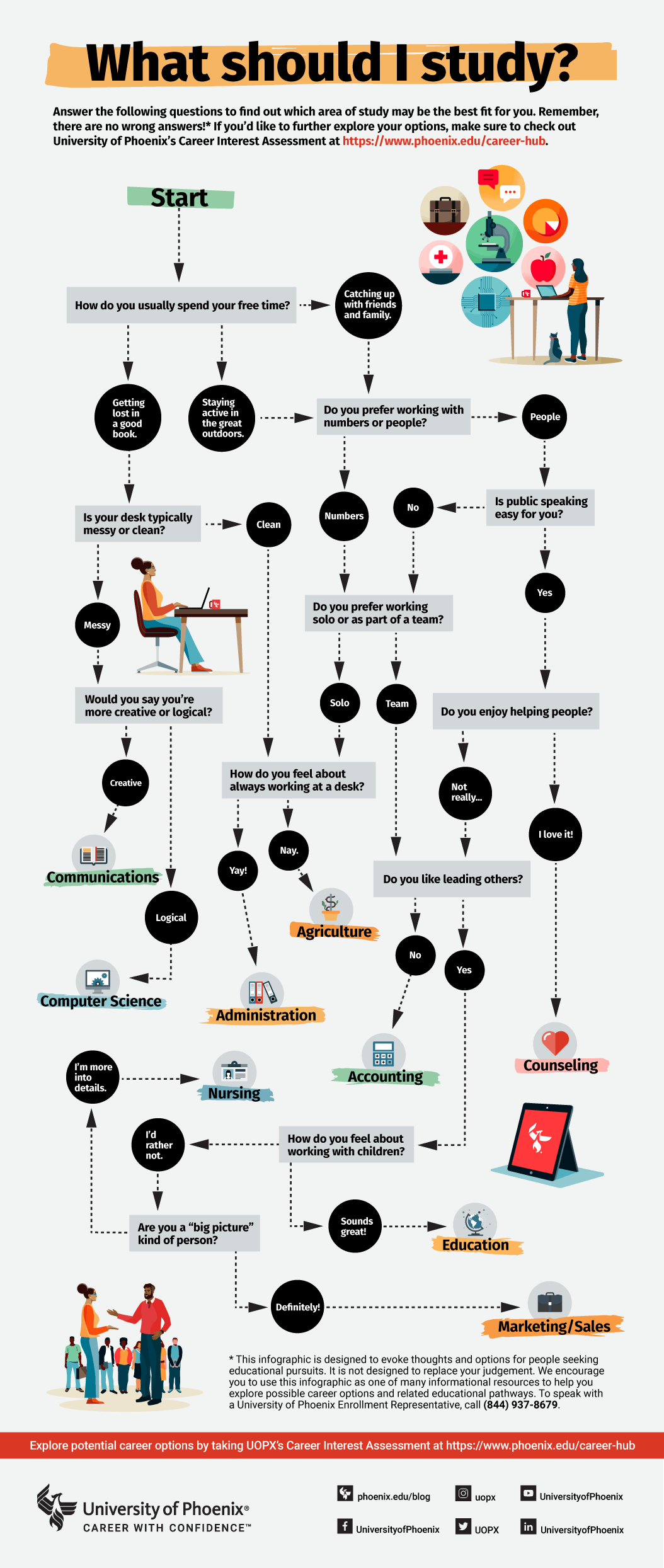Ten steps to choosing a major in college

Written by Michael Feder

Reviewed by Marc Booker, PhD, Vice Provost, Strategy

Choosing a major is one of the most important decisions a student makes. It will affect everything from career prospects and personal and professional satisfaction to earning potential. It’s not a decision to be made lightly. These ten steps help you narrow options, compare programs and choose confidently.
Why choosing a major in college matters
Here's a question to ask before choosing a major in college: Just how many professionals and managers have a college degree? According to the U.S. Census Bureau, in 2024, 76.5% of peope in professional and related occupations and 64.2% of people in management, business and financial occupations held a bachelor’s degree or higher.
There are more advantages to pursuing a bachelor’s degree in college. For starters, it correlates strongly with increased earnings for graduates, according to the U.S. Bureau of Labor Statistics (BLS). The real payoff, though, may just be having a career in which the work is exciting, fulfilling and informed by your interests.
How to choose a major in college
What’s the first step in this whole process? That’s right: It’s choosing the right major. Here’s where to start.
1. Ask yourself, 'Who am I?'
What are your interests? While it can be tempting to choose a major in college based solely on its earning potential, it’s important to also understand how your potential academic major figures into your interests and priorities. If you select a major that doesn’t align with your interests, then you’re likely to struggle with the work or even abandon the program entirely.
That’s why it’s important to ask yourself what interests you and what makes you stand out in the crowd. Let’s say you’re a people person and enjoy getting to know others. In this case, a degree in psychology might be well aligned with your interests. Someone more interested in machines, on the other hand, might feel more comfortable in the world of technology.
What are your priorities? Also identify your priorities. In other words, what do you value? Are you trying to help others while also earning a good living? Then nursing or education programs might make for a good fit. Do you believe in doing the right thing and upholding your ideals? Then criminal justice might be more your speed.
We all have internal compasses that point us toward our values. It’s important to listen to that voice in your head that tells you what kind of world you want to live in. Your decision about a major in college might be the first step in making that kind of world a reality. Explore your options.
What are your skills? Your strengths and weaknesses are a huge factor if you’re looking for an answer to the question, “What major should I choose?” You may have a passionate interest in a subject and still struggle with it. That doesn’t mean you shouldn’t choose to major in that discipline, but you should consider whether you’ll be able to handle the coursework. Some interests are better left outside of the classroom where you can pursue them at your own pace.
Additionally, consider the effect your prior experience may have on your studies moving forward. If you failed to complete a degree in the past but gained experience that might be helpful in a potential major in college when you re-enroll, you may want to think about earning credit for that experience in a related subject. Your prior work skills can be a big help in this regard.
2. Think about where you are now and where you want to be
What are your financial goals? Furthering your education is one of the best ways to increase your earning potential. Workers with higher levels of education typically earn more than those with less education, according to BLS. Similarly, they face lower unemployment rates. These numbers increase with the level of education, from associate to bachelor’s to master’s to doctoral degrees. Additionally, certain occupations pay more than others. The BLS Occupational Outlook Handbook covers the pay for hundreds of occupations. In short, the earnings potential of your education is a factor in picking your major in college.
Why are you pursuing education? Before enrolling in a program, think about the future. Why do you want this degree and what do you want to do with it? Are you looking for a job with the highest earning potential? Maybe you’re planning to join a family business. Maybe you dream of contributing to a certain field that requires a specific education. Everyone’s situation is different, but having a specific goal in mind can help you translate your goals into a degree program that’s perfect for you.
3. Plan for school, work and life balance
Hand in hand with your financial situation, it’s important to figure out where school fits into your life. Are you working a full-time job? Then you may want to pick a major that can be completed after business hours. After all, it doesn’t matter how profitable your choice of major in college is: If you can’t support yourself while you pursue your degree, it will be difficult to complete your classes.
Consider how you can make school work with your day-to-day life. Will your boss allow you to study during slower hours at work? Will an online degree provide you the flexibility an in-person education might not? It’s critical that you work out these considerations before beginning a program, so you can rest assured that both your life and your schoolwork are taken care of. Make a plan!
4. Decide what you want your degree to do for you
How much can you earn? Different degrees have different earning potentials. Degrees in fields such as business and computing rank among the highest earning, while non-technical degrees tend to rank lower. Of course, these insights are based on averages. Whichever degree you choose, there is a potential for higher or lower than average earning.
How much responsibility do you want? Along with potentially more money in your pocket, positions that require highly skilled employees generally come with more responsibilities. Some master’s degrees, for instance, can help prepare you to lead a team of employees for an organization.
It’s important to consider just how much responsibility you see yourself holding in your career. If you’re someone who seeks out leadership positions, then you may be required to earn a master’s degree or meet other qualifications.
What fulfills you? It’s hard to commit yourself to something you don’t believe in. Before committing to a major for its earning potential or authority, think about what brings fulfillment into your life. While pursuing your degree, you’ll have to summon the attention and effort to pass your classes and stay up on work. That’s going to be even more difficult if you lack interest or motivation in what you’re studying.
Look to your life experiences to find what gives your work meaning. Whether it be helping others, making discoveries, or anything in between, you may be able to find a major that gives you that same sense of satisfaction.
5. Research programs that align with your career goals
After you’ve figured out the kind of career you’re looking for and how it aligns with your values and interests, it’s time to start looking for majors in college. Even among specific fields, such as technology, there are a number of paths to take, like computer science and information technology. It’s important to research specific majors in your chosen field and weigh the pros and cons of each.
Standing out from the crowd is an important part of finding work after graduation. This may lead you to choose a major that few others are choosing. At the same time, the popularity of a specific major may indicate its market potential.
Regardless, information on just how many people graduate with one major or another is helpful. It can help steer you away from majors that have saturated the market or help you find in-demand work.
6. Get input from people you trust
When it comes to the important decision of picking your major in college, you’re not alone. Friends and family are great resources when it comes to understanding what’s involved with pursuing a specific major. They can help set expectations for pursuing specific degrees and give you a heads-up on potential challenges.
If your school provides access to an academic advisor, he or she can be another great resource for figuring out exactly what each area of study entails.
7. Choose a timeline that works for you
It’s up to you when and how you pursue your education. The last thing you want to do is rush into a program that isn’t the right fit. It might result in dropping out early and losing an important investment in your education.
You might have your major all figured out but not be in the right financial or mental space. It’s totally fine to wait on your education if it means taking care of your critical needs, whether that’s saving money to take off work or taking a break for your mental health.
By starting off on the right foot, you’re more likely to finish your major successfully and with minimum stress.
8. Consider a minor, second major or dual degrees
Picking just one major can be daunting, as it can feel like giving up on other paths. If that sounds familiar, then consider a minor or another major. Many students devote their primary major to a more lucrative career-starter while choosing a passion for a minor.
Whether you choose a minor, a second major that aligns with your primary major or something totally different, it can help show off your versatility. And that can make you stand out to potential employers.
9. Learn what happens if you change your mind
Even after committing to your major, you might have second thoughts. It can take months or even years to realize that a major is not the right fit for you. If that happens, the worst thing would be to lose the credits you’ve already earned.
To avoid that, see how your major’s requirements align with those of other majors. That way you can figure out plan B in case your first choice of major doesn’t work out. In some cases, the requirements for one major can be transferred to another without the need to restart. Just knowing you have a backup plan can make the whole process of choosing a major much easier.
At the same time, it’s crucial to understand any deadlines for a change in major. For instance, you probably won’t be able to change your major a few weeks before graduation. Although that’s an extreme example, it underlines the importance of knowing the rules for changing your major.
Make sure to talk with your academic advisor about options for changing your major or making adjustments after you’ve committed to a program.
10. Choose the degree program that fits best
You’ve done your research and seen how your interests align with your education. Now it’s time to pick your major. At this step, listen to your gut. If the thought of spending time and money studying a subject sends shivers up your spine, it may not be the right choice for you.
But if you get excited thinking about it, if you can visualize yourself working in a related field, it’s a very good sign that major is the right choice.
Need more help choosing a major in college?
Are you still choosing a major in college? University of Phoenix offers Prior Learning Assessment (PLA), which provides students the opportunity to earn college credit from life and work experience. The University also has competency-based education programs that take advantage of work experience.
UOPX’s degree finder is another helpful resource. It can guide you through the programs at UOPX and how they align with your specific interests.
Are ready to start your bachelor’s degree? Here are some popular fields of study at University of Phoenix:
- Behavioral Sciences
- Business
- Criminal Justice
- Education
- Healthcare
- Information Technology
- Environmental Science
- Nursing
- Psychology
Contact an admissions representative for more information about majors and programs.


ABOUT THE AUTHOR
A graduate of Johns Hopkins University and its Writing Seminars program and winner of the Stephen A. Dixon Literary Prize, Michael Feder brings an eye for detail and a passion for research to every article he writes. His academic and professional background includes experience in marketing, content development, script writing and SEO. Today, he works as a multimedia specialist at University of Phoenix where he covers a variety of topics ranging from healthcare to IT.

ABOUT THE REVIEWER
Dr. Marc Booker, University of Phoenix Vice Provost for Strategy, has more than two decades of experience working with online and distance education students at the post-secondary level. He currently oversees critical path academic initiatives to improve the student experience. Dr. Booker is a regular speaker, author and contributor to national higher education associations.
This article has been vetted by University of Phoenix's editorial advisory committee.
Read more about our editorial process.
Read more articles like this:

